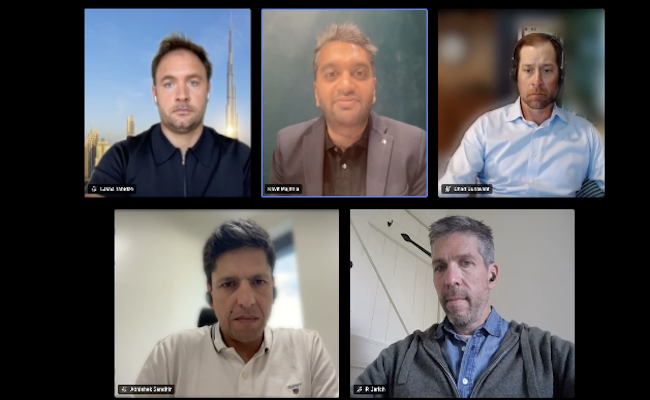A panel of experts across the telecoms ecosystem delved into the wide-ranging subject of AI deployment during Mobile World Live’s latest topic panel, which asked if operators should fully get on board the hype train and pinpointed the sector’s main motivations for using the technology.
Ultimately, panellists agreed the industry is grappling with three key elements around their AI purpose: to use the technology for the greater good of citizens; deploy it in internal operations to cut costs; and to develop new revenue-generating services.
Offering the operator perspective was emerging markets player Veon Group, whose digital operations and performance officer, Lasha Tabidze, acknowledged that while the company is already using the technology for services including customer experience, fraud detection and retail planning, these use cases are not what it considered most important on its AI journey.
“We are not only interested in efficiencies and cost savings. We think we have to augment the skills and competencies for our customers rather than just delivering and selling some gigabytes or digital services.”
Tabidze continued to state that Veon’s top vision for AI was to be able to develop the technology in such a way that it allows citizens to “create better versions of themselves.”
For example, by creating local language co-pilots for the communities, Veon wants to “create better doctors, teachers, parents, bankers and farmers”.
“For the B2C, our vision is to empower… to really increase the digital inclusion so that no-one stays behind. The GenAI train will go very fast. We have to ensure that the markets, consumers and customers we work with have access to technologies and most importantly, have access to the augmented intelligence they might use for their daily lives.”
Also speaking on the panel, Abhishek Sandhir, managing director of telecoms at Sand Technologies, echoed Tabidze’s enthusiasm on the crucial role the telecoms industry can play in the deployment and development of AI. He said the combination of 5G and fibre is “unlocking a lot of magic”, and the underlying objective for telcos should be to optimise capex and opex.
In developing its AI play, Sand chose to focus on the basic need of boosting telco profitability. “If you look at the returns of the telco sector, compared with any other utility, it lags”. Sandhir said that every other industrial sector performs better than telecoms, even though they all rely heavily “on connectivity provided by telecoms”.
The executive therefore argues that AI must be used to stem the flow of a struggling telco market and eventually reverse this trend.
Representing CSG, a company that provides back office support for around 350 telecoms operators globally, was Chad Dunavant, EVP chief product and strategy officer. He addressed the company’s AI priorities, providing a concrete example of how AI can positively impact telco operations, building on Sandhir’s point.
Dunavant explained CSG first formed a comprehensive AI strategy based largely on the data it already has at its disposal, generated from its work with operators.
And from there, it created a distinct AI-related use case to address an actual industry pain point.
“For us, it started with the billing domain,” he said. “We have customers that claim that more than 50 per cent of calls coming into the call centre or contact centre are related to confusion around billing.”
CSG then asked the question: “can we train these models to be more proactive in the way we engage with customers, helping them to understand those changes up front and really drive down the costs for the operator?”
Not only did the end result help with the cost objective, but also boosted the customer relationship and that is what you get “when you engage with customers proactively on their terms”, added Dunavant.
He said CSG used that example as something of a building block, as it continues to develop other models to address actual challenges facing the industry.
Save or make cash
In its research with operators, GSMA Intelligence head Peter Jarich revealed in the panel that capex and opex reduction is actually at the bottom of the list for the sector when it comes to AI, lagging behind customer experience, growing revenues and network strategy.
He said operators are mainly focused on the second point because “you can’t save your way to growth”, and customer experience is a key part of that.
Jarich concurred with Dunavant that improving customer experience, through services like billing, should be a key focus and once the technology is in place, network operations, delivery and efficiency are likely to drive down capex and opex in the process.
Then, the attention can turn to both access by using AI to make networks cheaper and also the sustainability aspect of AI-enabled energy efficiency.
“I think sometimes we forget that, customer experience is that revenue growth side of things. And that is what we need to see operators focus on.”
Dunavant acknowledged from his billing example, it was easy to measure a reduction in calls, meaning there was a cost cut. However, he also pointed out that by taking a proactive approach and positioning the service as a more personalised experience, churn could be prevented, resulting in revenue generation.
In the next 6-9 months, Dunavant believes that as AI-powered deployments increase, the industry will learn a lot about what is driving customer retention, which may or may not lead to upselling opportunities.
Finally, he said developing a personalised offering is non-negotiable.
“This is going to be an expectation. Every brand that engages with the customer is going to have these levels of relationships. And if we’re not doing it in our in our industry, customers are going to go somewhere else to find that level of engagement,” he said.
Taking into account the points made by Jarich, Sandhir and Dunavant, as well as the company’s wider vision, Tabidze said Veon is taking a three-step approach.
The first revolves around AI technology bringing in value to grow its business. The second is putting the customer at the front and centre, ensuring better experience through AI-based recommendation engines to deliver products in demand.
And the final part is being an AI pioneer not just for the costs and the revenues, but to increase the digital economies for the societies Veon operates in.
“With GenAI, when the train goes on hyper speed, we really have to be at the front of the development of the societies and economies so that no-one is left behind. This is how we bring change, and we can really bring impact.”
The topic panel also included discussion on telco large language models, the use of data and challenges to AI deployment and adoption.
Catch up on the full session here.




